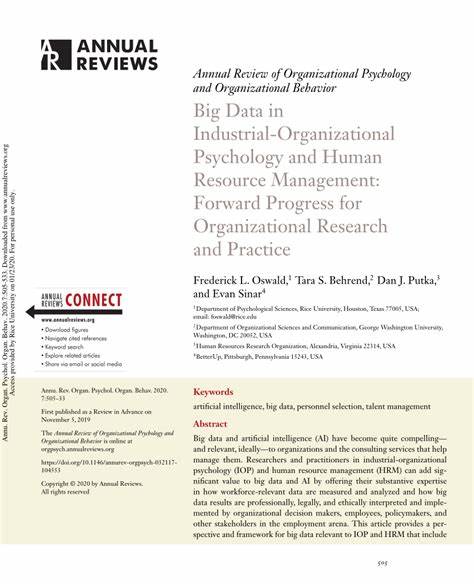Machine Replacement: A Mind-Role Fit Perspective
IF 31.1
1区 管理学
Q1 MANAGEMENT
Annual Review of Organizational Psychology and Organizational Behavior
Pub Date : 2024-09-04
DOI:10.1146/annurev-orgpsych-030223-044504
引用次数: 0
Abstract
Here we review work examining reactions to machines replacing humans in both professional and personal domains. Using a mind-role fit perspective, we synthesize findings across several decades of research spanning multiple disciplines to suggest the types and trends for how people will respond to machines replacing humans. We propose that as intelligent machines have evolved to possess “minds,” their range of replacement and the scope of people's reactions to this replacement increase. Additionally, we suggest that people's reactions to machine replacement depend on the fit between the perceived mind of the machine and their ideal conception of the mind deemed suitable for that particular role. Our review organizes the literature on machine replacement into three distinct phases: the pre-2000s era, characterized by the perception of machines as mindless tools; the 2000s, which explored the extent to which machines are perceived as possessing minds; and the 2010s, marked by the proliferation of artificial intelligence and the emergence of reactions such as algorithm aversion and appreciation. This review suggests that our mind-role fit perspective is influenced by three key factors: how an individual in the machine interaction is involved in or affected by the introduction of intelligent machines, the characteristics of the machine itself, and the nature of the task the machine is intended to perform.机器替代:心灵角色契合视角
在此,我们回顾了在专业和个人领域对机器取代人类的反应进行研究的工作。我们从思想与角色契合的角度出发,综合了几十年来跨越多个学科的研究成果,提出了人们对机器取代人类的反应类型和趋势。我们提出,随着智能机器进化到拥有 "思想",它们的替代范围和人们对这种替代的反应范围都会增加。此外,我们还提出,人们对机器替代的反应取决于机器的感知思维与他们认为适合该特定角色的理想思维概念之间的契合度。我们的综述将有关机器替代的文献分为三个不同的阶段:2000 年代以前,人们认为机器是没有思想的工具;2000 年代,人们探讨了机器在多大程度上被认为拥有思想;2010 年代,人工智能的普及以及算法厌恶和欣赏等反应的出现标志着这一阶段的到来。这篇综述表明,我们的 "心智-角色契合 "观点受到三个关键因素的影响:机器互动中的个体如何参与智能机器的引入或受到其影响、机器本身的特点以及机器要执行的任务的性质。
本文章由计算机程序翻译,如有差异,请以英文原文为准。
求助全文
约1分钟内获得全文
求助全文
来源期刊
CiteScore
24.20
自引率
2.20%
发文量
22
期刊介绍:
Launched in March 2014, the Annual Review of Organizational Psychology and Organizational Behavior is a publication dedicated to reviewing the literature on I/O Psychology and HRM/OB.
In the latest edition of the Journal Citation Report (JCR) in 2023, this journal achieved significant recognition. It ranked among the top 5 journals in two categories and boasted an impressive Impact Factor of 13.7.

 求助内容:
求助内容: 应助结果提醒方式:
应助结果提醒方式:


